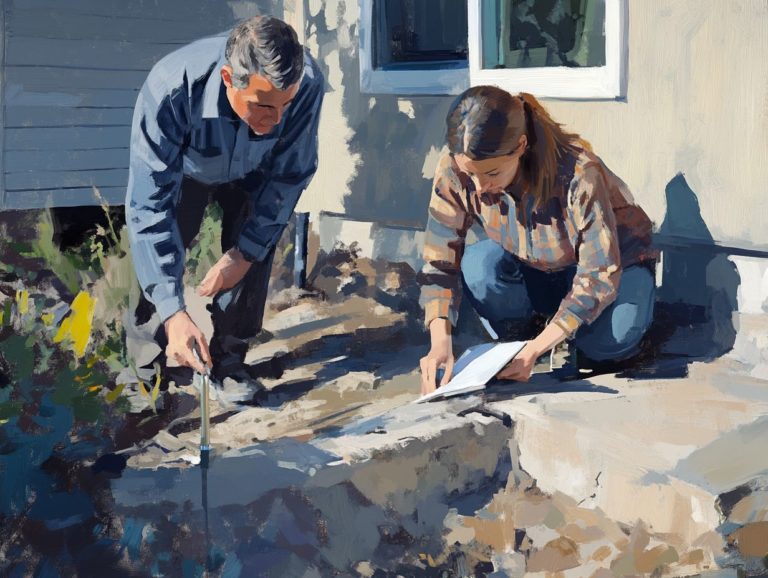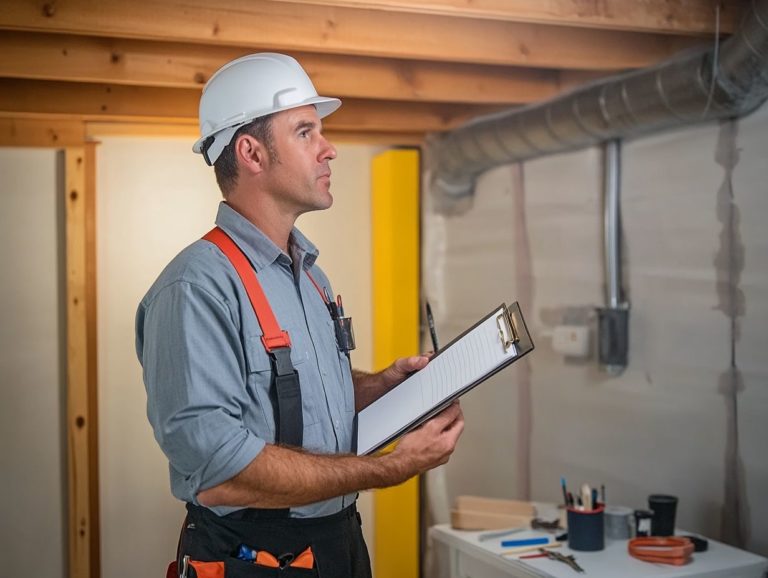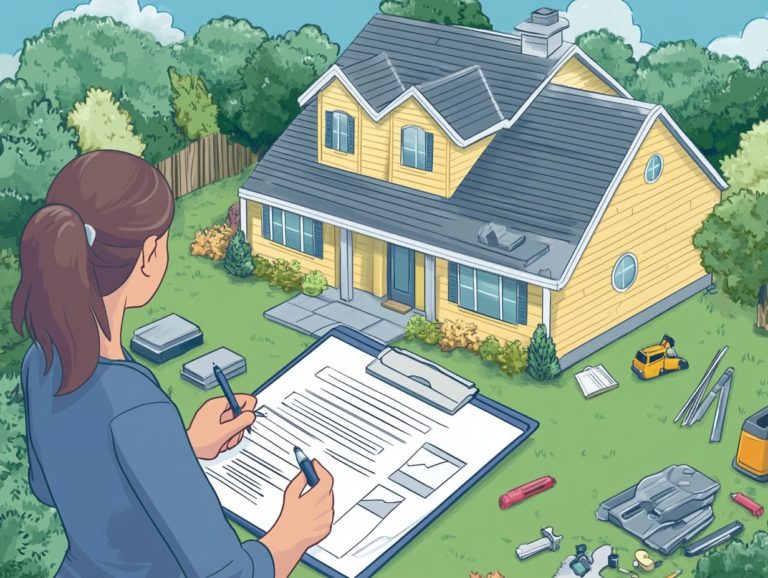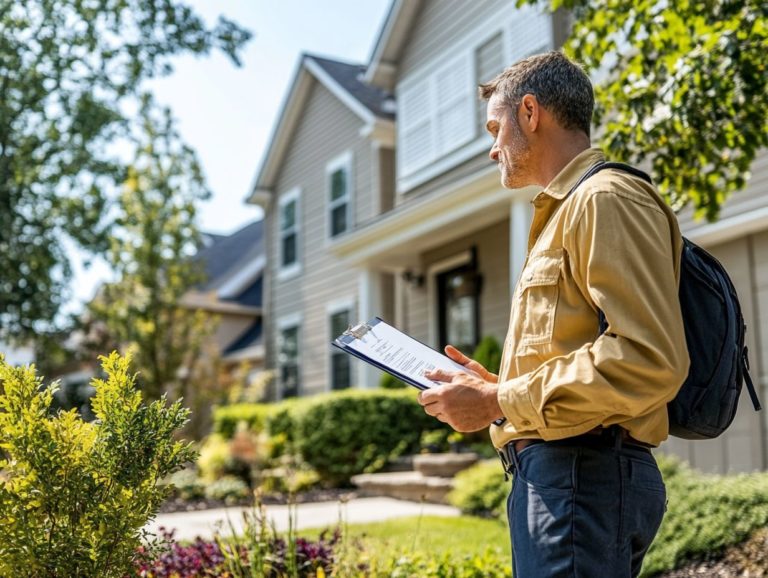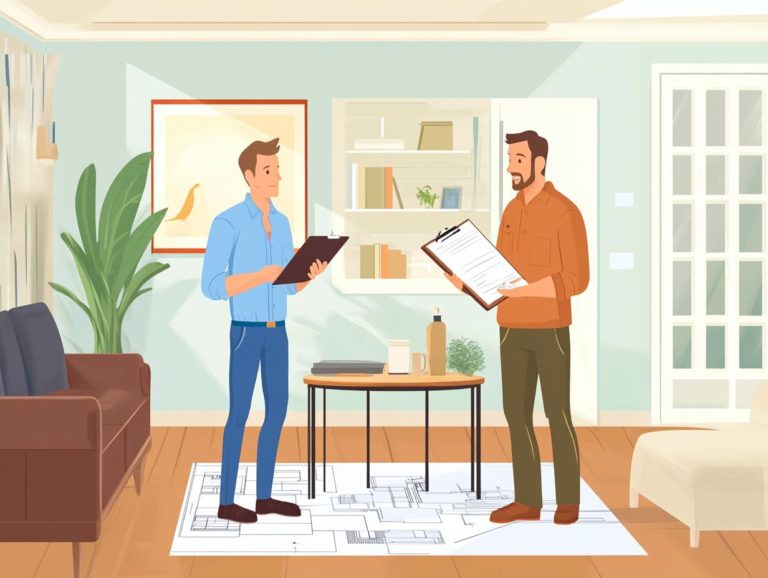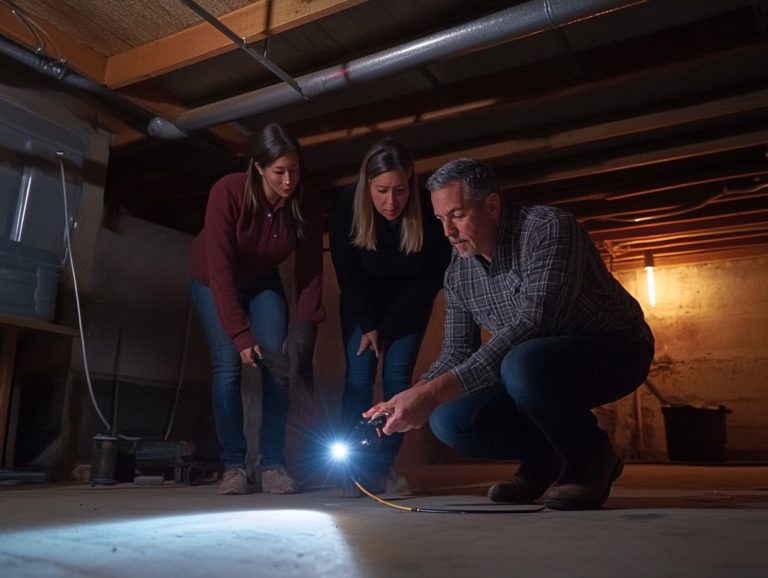How to Prepare for Your Home Inspection
A home inspection is an essential milestone in the buying or selling journey, offering you invaluable insights into the condition of a property.
Grasping its purpose and significance empowers you to make well-informed decisions, whether you re navigating the market as a first-time buyer or a seasoned seller.
This article delves into how you can select the right home inspector, prepare your home for the inspection, and effectively interpret the results. It also highlights common issues that may arise during inspections and provides tips to ensure a seamless experience.
Contents
- Key Takeaways:
- What is a Home Inspection?
- Choosing the Right Home Inspector
- Preparing Your Home for Inspection
- Common Issues Found During Inspections
- Understanding the Inspection Report
- Tips for a Successful Inspection
- Frequently Asked Questions
- What is a home inspection and why is it important?
- When should I start preparing for my home inspection?
- What key areas should I check before the inspection?
- What are some common issues that may be found during a home inspection?
- How can I prepare my home for a successful inspection?
- Can I attend the home inspection?
Key Takeaways:

- Understand the purpose and importance of a home inspection to ensure the safety and quality of your home.
- Choose a qualified and experienced home inspector with the necessary credentials to conduct a thorough inspection.
- Prepare your home for inspection by completing necessary repairs, decluttering, and making the inspector’s job easier.
What is a Home Inspection?
A home inspection is an in-depth evaluation of a property’s condition, usually performed by a qualified home inspector.
This essential process is designed to uncover any potential defects and repair issues prior to a real estate transaction. By engaging in this thorough assessment, both buyers and sellers gain a transparent view of the home’s condition, significantly impacting the selling price and key negotiation points.
Purpose and Importance of a Home Inspection
The purpose of a home inspection is to provide you with a comprehensive evaluation of a property’s condition. This careful check shows possible problems that will help you navigate the complexities of a real estate transaction, whether you’re a buyer or seller.
This thorough assessment reveals potential issues, from significant repairs like roof replacements to minor cosmetic flaws, ensuring that no detail is overlooked.
For you as a potential buyer, the findings from the inspection will be a crucial part of your negotiation strategy. They often influence the final home appraisal value, protecting your investment. By addressing these issues upfront, you can sidestep unexpected repair costs down the line.
For sellers, this proactive approach leads to a smoother transaction and can even increase the home’s market appeal. Ultimately, a thorough inspection promotes transparency and trust, paving the way for a successful closing process for everyone involved.
Choosing the Right Home Inspector
Choosing the right home inspector is vital for securing an accurate assessment of a property’s condition. The qualifications and experience of the inspector can profoundly impact the quality of the inspection report and the insights you receive throughout the process.
Making an informed choice here can save you from future headaches and ensure you have a comprehensive understanding of your potential investment.
Qualifications and Credentials to Look for
When selecting a home inspector, it s vital to consider various qualifications and credentials that signify a professional’s ability to conduct thorough inspections and generate reliable reports.
Industry certifications like ASHI (American Society of Home Inspectors) and InterNACHI (International Association of Certified Home Inspectors) not only bolster a professional s credibility but also reassure you of their dedication to upholding exceptional standards.
These certifications involve comprehensive training and ongoing education, enabling inspectors with the expertise needed to evaluate different property types effectively. Practical experience is equally important, as each property can present its own unique challenges.
Using an inspection checklist can benefit both inspectors and home buyers by providing a structured approach to the process. This ensures that critical aspects aren t overlooked while also facilitating clear communication about any potential issues that may arise.
Preparing Your Home for Inspection

Preparing your home for inspection is an essential part of the selling process. By taking the time to ensure everything is in order, you can significantly enhance the chances of receiving a favorable inspection report. For more guidance, check out this article on how to prepare for a successful home inspection and minimize the likelihood of repair issues being raised by prospective buyers.
Steps to Take Before the Inspector Arrives
Before the inspector arrives, take several proactive steps to ensure a smooth and efficient home inspection process by following how to prepare for a home inspection, emphasizing cleanliness, accessibility, and documentation.
- Declutter each room to allow easy movement throughout the property.
- Tackle minor repairs fix leaky faucets and squeaky doors.
- Gather important maintenance records detailing past work done on your home; they can be invaluable during the inspection.
- Ensure clear access to critical systems like plumbing, HVAC, and electrical components to facilitate a thorough evaluation.
- Check light fixtures and outlets, making necessary adjustments to eliminate potential obstacles.
These preparatory actions pave the way for a favorable inspection outcome and benefit everyone involved in the process.
Common Issues Found During Inspections
Home inspections frequently uncover a range of common issues that can impact a property’s value and safety. You must address these concerns quickly!
By doing so, you enhance your property’s appeal to potential buyers and pave the way for a smoother transaction.
Identifying and Addressing Potential Problems
Identifying potential issues during a home inspection is crucial. It benefits both sellers and buyers as it greatly influences the property’s condition and perceived value.
Being aware of common home defects like faulty wiring, plumbing issues, or deteriorating roofing enables you to distinguish between major repairs requiring substantial investments and minor issues that are manageable.
Addressing these concerns promptly enhances the property’s overall appeal and becomes a compelling negotiating point during transactions.
By prioritizing proactive measures such as routine maintenance and thorough inspections, you can preserve your property’s integrity. This approach helps you secure better concessions from sellers, paving the way for a favorable outcome for everyone involved.
Understanding the Inspection Report
Grasping the inspection report is crucial for both home buyers and sellers. It provides a detailed summary of the property’s condition, guiding you through the next steps in the home selling process or aiding in your decision-making as a buyer.
Interpreting the Results and Next Steps
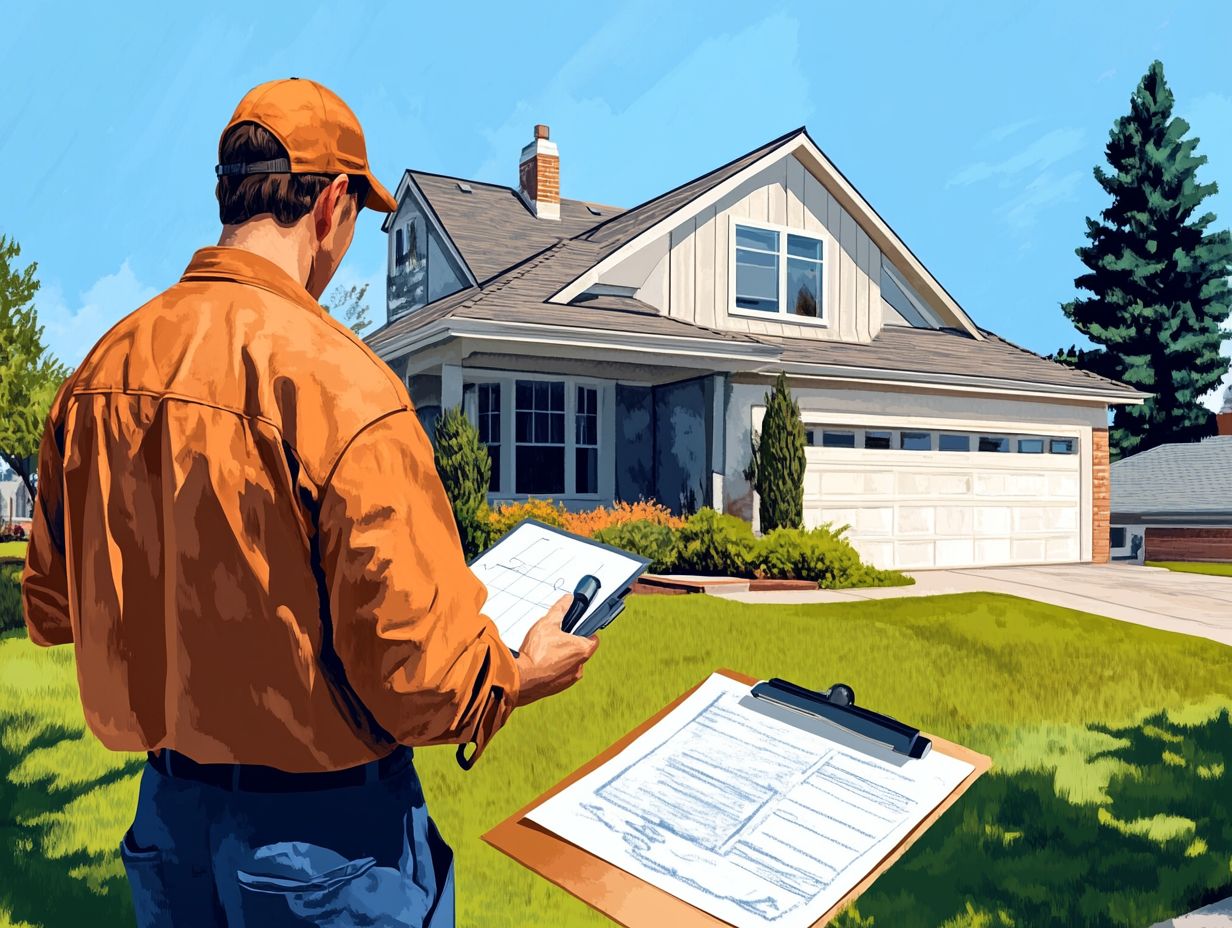
Interpreting the results of an inspection report requires closely analyzing the findings and identifying necessary home repairs. This insight allows you to negotiate effectively with the buyer or prepare your home for the market.
This process brings urgent issues, like structural defects or electrical problems, to light and enables you to prioritize repairs that can significantly boost your property’s value.
By concentrating on the most impactful improvements, you streamline the inspection process for potential buyers and showcase your commitment to maintaining the home’s integrity. Additionally, knowing how to stay calm during a home inspection can further enhance your approach.
Understanding the significance of these findings enables you to make informed decisions, fostering goodwill and confidence in the transaction. For buyers, this transparency provides a clear overview of the property’s condition, allowing them to assess their investment with greater clarity.
Tips for a Successful Inspection
To ensure a successful home inspection, embrace specific strategies outlined in how to prepare for a home inspection that can significantly elevate the experience for both sellers and potential buyers.
By doing so, you pave the way for a more favorable inspection report.
Start preparing your home today to make the most of your inspection!
What to Do and Avoid During the Inspection
Understanding how to prepare for a home inspection can significantly influence your buyer’s inspection by highlighting what to do and what to avoid during the process.
It can also shape the overall impression you leave on the home inspector.
Being fully present during the inspector’s visit shows real interest and fosters a cooperative atmosphere. To enhance your experience, preparing for a home inspection with a thorough checklist can prove invaluable. It allows you to proactively address any potential concerns.
Engaging with the inspector is crucial asking questions and maintaining clear communication leads to a more comprehensive understanding of the property.
On the flip side, trying to hide repair issues or adopting a defensive posture can breed distrust. Such behaviors might negatively impact the inspection results, as well as subsequent negotiations, potentially leaving you questioning the integrity of the entire process.
Frequently Asked Questions
What is a home inspection and why is it important?
A home inspection is a thorough examination of parts of the home like the roof, plumbing, electrical, and HVAC systems. It is important because it can identify any potential issues or repairs needed before finalizing the purchase of a home.
When should I start preparing for my home inspection?
You should start preparing right after your offer is accepted! This gives you enough time to address any potential issues or repairs before what to expect during a home inspection takes place.

What key areas should I check before the inspection?
Some important areas to focus on include the exterior of the home, the roof, the plumbing and electrical systems, the HVAC system, and the foundation. Additionally, consider these tips for a successful home inspection day to ensure that decluttering and cleaning the interior of the home allows for easy access during the inspection.
What are some common issues that may be found during a home inspection?
Common issues might include electrical problems, plumbing leaks, roof damage, foundation issues, or safety hazards. The inspector may also identify smaller issues such as peeling paint or loose handrails.
How can I prepare my home for a successful inspection?
To prepare for a successful inspection, address any repairs identified during a pre-inspection. Ensure all utilities are turned on and easily accessible. Remove any clutter or obstructions that may impede the inspection. Additionally, knowing how to prepare for a home inspection as a buyer can be helpful, as it’s beneficial to have all necessary paperwork and documentation organized and readily available.
Can I attend the home inspection?
Yes, it is recommended that you attend the home inspection. This allows you to ask questions and get a better understanding of any issues or repairs that may be identified. It’s also a great opportunity to learn more about the overall condition of the property.

